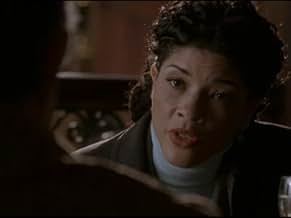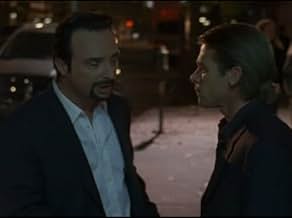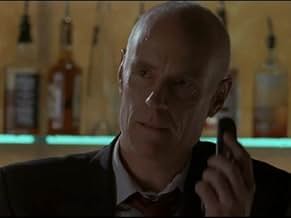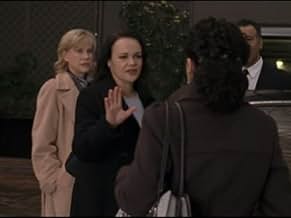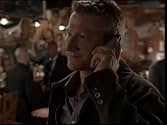Intelligence
- Série télévisée
- 2005–2007
- 44min
NOTE IMDb
8,1/10
2,3 k
MA NOTE
Le crime organisé et l'Unité du crime organisé (UCO) travaillent ensemble pour atteindre les objectifs opposés de chaque monde respectif.Le crime organisé et l'Unité du crime organisé (UCO) travaillent ensemble pour atteindre les objectifs opposés de chaque monde respectif.Le crime organisé et l'Unité du crime organisé (UCO) travaillent ensemble pour atteindre les objectifs opposés de chaque monde respectif.
- Récompenses
- 9 victoires et 15 nominations au total
Parcourir les épisodes
Avis à la une
I was amazed by the first season of Intelligence, and am looking forward to the second season in a few weeks.
The ambiguity of the characters has always been a big draw for me: a likable main character is a major drug dealer, a police informant, and a dad going through a messy divorce who occasionally remembers what he saw in his soon-to-be-ex-wife. His biggest business issue is that he can't launder money fast enough to keep up with his sales...
Who are the good guys? Who are the bad guys? Just what does it mean to be good, anyway? And what does it mean to be bad? If you like these sorts of questions, you will like Intelligence. If you like your drama clear-cut, you won't.
The ambiguity of the characters has always been a big draw for me: a likable main character is a major drug dealer, a police informant, and a dad going through a messy divorce who occasionally remembers what he saw in his soon-to-be-ex-wife. His biggest business issue is that he can't launder money fast enough to keep up with his sales...
Who are the good guys? Who are the bad guys? Just what does it mean to be good, anyway? And what does it mean to be bad? If you like these sorts of questions, you will like Intelligence. If you like your drama clear-cut, you won't.
This show took me by surprise! This is a crime drama that does innovative things. For starters there is no good or bad. Or at least it isn't clear cut. Everybody has his own agenda. Inspector Mary Spalding uses informants from the criminal circuit in order to gather information and modernize the Canadian intelligence agency (to fight crime and international terrorism). But at the same time these informants get favors in return to maintain their business. Quite ridiculous if you think about it. But I guess that is needed nowadays. All is done for the greater good. The events are fast paced and demand that you stay focused. But losing the plot won't be a problem since it is so good that you will be drawn in. This show is filled with tense moments and makes it almost impossible to predict what is going to happen. This offers quite some interesting viewing! The whole cast is excellent with no exceptions. The way characters act and react to events are done so realistically that is very hard not to sympathize with them. But Ian Tracey (Jimmy Reardon) and Klea Scott (Mary Spalding) give that something extra to their characters that make the show even better. It is interesting to see how they handle matters and do their work. I never once got the feeling that it was made up or fake. Everything is so believable that it is a joy to watch. "Intelligence" is thrilling to the last minute and is without a doubt one of the best crime shows ever made. I am very sad that a show this good got canceled. At least they could have given the fans an extra episode for a decent closure.
I came across this old favourite of mine on late night TV today and once again found it a wonderful change from the usual drivel. The plots are well written and character driven; the writer Chris Haddock assumes that viewers have intelligence themselves and writes to entertain adults, not juveniles. I had not intended to stay up so late but could not help myself after just a few minutes into the episode. The acting is excellent and understated and it is that plus the brilliantly complex story lines which drive the show, not bombs, guns and fighting that are so common in most shows. Having said that, when there is action but it is used to drive the plot line, not hide the fact that there isn't one.
It has always puzzled me why this sort of show along with others such as The Border are cancelled prematurely while so much lesser crud survives. Maybe they are just too real and to the point ? Meanwhile Clint Eastwood seems to have found Haddock and uses him to make great movies, so maybe this is more of our Canadian inferiority complex once again asserting itself ? Like Joni Mitchell said "Don't it always seem to go that you don't know what you've got 'til its gone....."
It has always puzzled me why this sort of show along with others such as The Border are cancelled prematurely while so much lesser crud survives. Maybe they are just too real and to the point ? Meanwhile Clint Eastwood seems to have found Haddock and uses him to make great movies, so maybe this is more of our Canadian inferiority complex once again asserting itself ? Like Joni Mitchell said "Don't it always seem to go that you don't know what you've got 'til its gone....."
I think a lot of Americans are just discovering "Intelligence" four years after it was canceled on Canadian television. This American revival of the show began when Netflix began carrying both Season 1 and Season 2 of "Intelligence" in streaming video. It is in the same rare class of crime dramas like "Damages" and more recently "The Killing" which completed it's first season this year on the AMC cable channel.
I was already aware of the talents of Klea Scott. Klea was cast as Special Agent Emma Hollis in the final season (Season 3) of Chris Carter's groundbreaking show "Millennium." She's the first black female to ever be cast in a co-starring role in a television police procedural. In "Millennium" she projected an intuitive intelligence and quiet intensity that serves her so well in "Intelligence." I grew to like Klea Scott's portrayal of Emma Hollis so much, I began to watch "Millennium" as much for her role as I did for Lance Hendrikson's riveting role as Frank Black. The conflicted alliance between Scott's Emma Hollis and renegade FBI agent Frank Black has a strong resemblance to the unlikely bond formed between Mary Spalding and Jimmy Reardon in "Intelligence." It's hard to tell whom is the master and who in the student in the relationship.
The main reason I started watching "Intelligence" was Klea Scott's involvement in the show but I also became an avid fan of Ian Tracey after watching the pilot episode of the show. He's the master of understated intensity as Jimmy Reardon.
"Intelligence" is the first show I've seen that really allows Ian Tracey full command of his acting talents. Like Klea Scott, Tracey is a low decibel stoic actor who projects an utter authenticity and a unique form of anti-charisma in his role as Jimmy Reardon. It's always been the quiet and soft spoken actors that have always seemed the most menacing to me.
Ian Tracey's talent is to transform Jimmy Reardon, a thug and drug dealer into a sympathetic character. Some would even say would say Reardon is a compassionate character but his compassion is reserved for those who serve him well. Reardon even confides in his partner that he genuinely likes his nemesis Mary Spalding, but one wonders if he's merely assessing Spalding's value as an asset to his criminal counter- intelligence operation. Despite Reardon's easy going likability, he never strays too far from his ruthless impulses toward any rival who invades his turf to take his castle to plunder his wealth and do harm to himself, his loved ones or his partners in crime. Mary Spalding has her own set of enemies in her law enforcement agency and many of Spalding's bureaucratic rivals are every bit as despicable and cut-throat as Reardon's rivals in organized crime.
Chris Haddock's creative ideas and writing are a key element of the show but it's the acting chemistry between Klea Scott and Ian Tracey that makes "Intelligence" such a remarkable show. In many ways Scott's Mary Spalding character and Tracey's Jimmy Reardon characters are mirrored images of each other. Both characters are highly intelligent and overly ambitious fixers who know how to use power to get other people to do their bidding. In another life Mary and Jimmy could have been soul mates.
Paradoxically, neither Spalding nor Reardon have great deal of respect for the formal line of demarcation that separates the law enforcement agent from the common criminal. Mary Spalding is pragmatic enough to tolerate the success of an upper-tier cannabis dealer like Reardon because she has bigger fish to fry in the world of organized crime. Why not win the confidence of Reardon?
Spalding's logic is built on the assumption that the survival Reardon's criminal enterprise is equally threatened by the same forces of evil who would do murder and mayhem to innocent members of society at large. In a sense, Reardon is an ethical criminal because he doesn't intentionally prey on the innocent or destroy the fabric of the prevailing social order to make his living. Even so, sh*t happens and innocent civilians get damaged as a result of Reardon's chosen vocation as a career criminal. The same charges could be leveled against any C.E.O. of a Fortune 500 company.
It's this highly unorthodox pact of non-aggression formed between cop and criminal on the basis of mutual self interest, the makes "Intelligence" such a fascinating show to watch. At times it's hard to tell who's the hunter and who's the game. Both players are willing sacrifice the niceties of ethical behavior to their own ferocious ambition. Spalding and Reardon form the same kind of unholy alliance used by nearly all upwardly mobile and ambitious people in everyday life to defeat their ruthless competitors who seek to replace them on the throne, be it in organized crime, law enforcement, or the more mundane world of business. Sleeping with the enemy is an highly effective career strategy for those who can survive the hazards of doing so.
The most intriguing aspect of "Intelligence" is the dance of seduction between Mary Spalding & Jimmy Reardon. It's the story of a scary smart female operative who attempts to win the confidence of the perhaps an even smarter male informant by ritualized and sometime unintentional trade of high value intelligence information. Both characters are inside traders who traffic in the world's most valuable currency: information. Ultimately the most intelligent player who builds the most effective intelligence network will win the game. Everyone else is a pawn in this game. It was a wondrous and harrowing ride through the two seasons of "Intelligence" and I was sad on the day I finally viewed the last episode of the final season. I knew I wouldn't be a crime drama as good as "Intelligence" on any television network for a long long time.
I was already aware of the talents of Klea Scott. Klea was cast as Special Agent Emma Hollis in the final season (Season 3) of Chris Carter's groundbreaking show "Millennium." She's the first black female to ever be cast in a co-starring role in a television police procedural. In "Millennium" she projected an intuitive intelligence and quiet intensity that serves her so well in "Intelligence." I grew to like Klea Scott's portrayal of Emma Hollis so much, I began to watch "Millennium" as much for her role as I did for Lance Hendrikson's riveting role as Frank Black. The conflicted alliance between Scott's Emma Hollis and renegade FBI agent Frank Black has a strong resemblance to the unlikely bond formed between Mary Spalding and Jimmy Reardon in "Intelligence." It's hard to tell whom is the master and who in the student in the relationship.
The main reason I started watching "Intelligence" was Klea Scott's involvement in the show but I also became an avid fan of Ian Tracey after watching the pilot episode of the show. He's the master of understated intensity as Jimmy Reardon.
"Intelligence" is the first show I've seen that really allows Ian Tracey full command of his acting talents. Like Klea Scott, Tracey is a low decibel stoic actor who projects an utter authenticity and a unique form of anti-charisma in his role as Jimmy Reardon. It's always been the quiet and soft spoken actors that have always seemed the most menacing to me.
Ian Tracey's talent is to transform Jimmy Reardon, a thug and drug dealer into a sympathetic character. Some would even say would say Reardon is a compassionate character but his compassion is reserved for those who serve him well. Reardon even confides in his partner that he genuinely likes his nemesis Mary Spalding, but one wonders if he's merely assessing Spalding's value as an asset to his criminal counter- intelligence operation. Despite Reardon's easy going likability, he never strays too far from his ruthless impulses toward any rival who invades his turf to take his castle to plunder his wealth and do harm to himself, his loved ones or his partners in crime. Mary Spalding has her own set of enemies in her law enforcement agency and many of Spalding's bureaucratic rivals are every bit as despicable and cut-throat as Reardon's rivals in organized crime.
Chris Haddock's creative ideas and writing are a key element of the show but it's the acting chemistry between Klea Scott and Ian Tracey that makes "Intelligence" such a remarkable show. In many ways Scott's Mary Spalding character and Tracey's Jimmy Reardon characters are mirrored images of each other. Both characters are highly intelligent and overly ambitious fixers who know how to use power to get other people to do their bidding. In another life Mary and Jimmy could have been soul mates.
Paradoxically, neither Spalding nor Reardon have great deal of respect for the formal line of demarcation that separates the law enforcement agent from the common criminal. Mary Spalding is pragmatic enough to tolerate the success of an upper-tier cannabis dealer like Reardon because she has bigger fish to fry in the world of organized crime. Why not win the confidence of Reardon?
Spalding's logic is built on the assumption that the survival Reardon's criminal enterprise is equally threatened by the same forces of evil who would do murder and mayhem to innocent members of society at large. In a sense, Reardon is an ethical criminal because he doesn't intentionally prey on the innocent or destroy the fabric of the prevailing social order to make his living. Even so, sh*t happens and innocent civilians get damaged as a result of Reardon's chosen vocation as a career criminal. The same charges could be leveled against any C.E.O. of a Fortune 500 company.
It's this highly unorthodox pact of non-aggression formed between cop and criminal on the basis of mutual self interest, the makes "Intelligence" such a fascinating show to watch. At times it's hard to tell who's the hunter and who's the game. Both players are willing sacrifice the niceties of ethical behavior to their own ferocious ambition. Spalding and Reardon form the same kind of unholy alliance used by nearly all upwardly mobile and ambitious people in everyday life to defeat their ruthless competitors who seek to replace them on the throne, be it in organized crime, law enforcement, or the more mundane world of business. Sleeping with the enemy is an highly effective career strategy for those who can survive the hazards of doing so.
The most intriguing aspect of "Intelligence" is the dance of seduction between Mary Spalding & Jimmy Reardon. It's the story of a scary smart female operative who attempts to win the confidence of the perhaps an even smarter male informant by ritualized and sometime unintentional trade of high value intelligence information. Both characters are inside traders who traffic in the world's most valuable currency: information. Ultimately the most intelligent player who builds the most effective intelligence network will win the game. Everyone else is a pawn in this game. It was a wondrous and harrowing ride through the two seasons of "Intelligence" and I was sad on the day I finally viewed the last episode of the final season. I knew I wouldn't be a crime drama as good as "Intelligence" on any television network for a long long time.
7ivko
I recently stumbled on this show by accident while doing an IMDb search on an actor. Being your typical insular American I had never heard of 'Intelligence' or even the CBC, but I have to say that after watching the first two seasons I am very impressed. Sadly, rumors are that the show has been canceled so I suppose some things about Americans and Canadians are the same; 'The Wire' was never appreciated by viewers here either. The show is an extremely smart (or intelligent; get it? hah hah hah) approach to the world of espionage and organized crime. Shows that I've seen in the past dealing with these topics were most often disappointing in their shallowness and over-simplification of a complex and difficult world. As an example, one of my pet peeves is that often when you watch a show about the CIA you would think that there are exactly 10 people working for the agency. 5 covert operatives and 5 analysts/technical operators. Studio execs will tell you they compress the number of characters so that audiences don't get confused, but to me the whole thing usually just comes off fake. "Meet Joe, he's our computer/linguistic/explosives expert who joined the Navy Seals after getting his Phd's from Harvard and is now a US senator." Fake.
Not so with 'Intelligence'. The show has a large and diverse cast, allowing the show to explore the facets of characters in a more organic way. Of course, a large cast also means some characters you would like to see more of just can't get the screen time you would like but that's the trade off and, in my opinion, it's well worth it.
I've always been fascinated with the spy world, all those secrets within secrets makes for fascinating mental games, and the back story of Canada attempting to create their own international spy ring provides great opportunities for story lines. Add to that the very realistic portrayal of life in a drug kingpin syndicate and there is always plenty of interesting plots developing, often independently, in each episode.
Ian Tracey plays Jimmy Reardon, a weed drug smuggler who has built quite the little empire in Canada. Jimmy has done quite well for his "family", but the difficulties of success are beginning to make his life difficult. His life plays out like that of any successful business exec; constant meetings all day, inept employees, and logistical nightmares of running an organization with hundreds of employees. Contrary to popular images of drug dealers Jimmy is quiet, reasoned, not prone to fits of anger, and prefers to make well informed decisions that avoid violence whenever possible. Eventually, circumstances conspire to bring Jimmy into contact with Mary Spalding, played by Klea Scott.
Mary is, in basic personality, much like Jimmy. Quiet, tough, and highly capable, she is currently running the Canadian Organized Crime Unit, but is being tapped for a leadership position in the newly forming (or organizing, I'm not really sure which) Canadian intelligence service CSIS. Working in an old-boys network along side some of the worst vipers you've ever seen, Mary is a human intelligence specialist. She recruits confidential informants and, soon, spies. Events unfold that allow Mary to recruit Jimmy as what may possibly be the agencies most valuable asset. Occasionally their interests merge and Jimmy and Mary can help one another, though they maintain a careful cat and mouse routine between the two of them, not really trusting the other.
The truly fascinating thing (for me) to watch is how the CSIS agency builds itself into a real force to be reckoned with, and the ethical dilemmas that begin to unfold as they succeed. At first many of Mary's recruits approach her, or are in situations where they can help one another, but as soon as her higher-ups realize she's making it happen specific requests start pouring in and the decisions get harder. The agency begins to resort to blackmail and extortion to accomplish it's tasks. It raises interesting points. The CIA has (often rightly) taken a lot of heat here in the states for its actions in the past, but those same critics want intelligence agencies to be affective in preventing the next domestic attack on our nation. There is a definite moral and ethical trade-off that takes place with effectiveness at some point, and the show does a great job of highlighting that.
I won't bother going into the other characters on the show. As I said, there are a lot of them, but I'll say that most are well created and interesting. The show has enough action to keep the pace up in most episodes and the filming quality is decent though a bit of a step down if you are used to American production values. Definitely worth watching if you get the opportunity.
Not so with 'Intelligence'. The show has a large and diverse cast, allowing the show to explore the facets of characters in a more organic way. Of course, a large cast also means some characters you would like to see more of just can't get the screen time you would like but that's the trade off and, in my opinion, it's well worth it.
I've always been fascinated with the spy world, all those secrets within secrets makes for fascinating mental games, and the back story of Canada attempting to create their own international spy ring provides great opportunities for story lines. Add to that the very realistic portrayal of life in a drug kingpin syndicate and there is always plenty of interesting plots developing, often independently, in each episode.
Ian Tracey plays Jimmy Reardon, a weed drug smuggler who has built quite the little empire in Canada. Jimmy has done quite well for his "family", but the difficulties of success are beginning to make his life difficult. His life plays out like that of any successful business exec; constant meetings all day, inept employees, and logistical nightmares of running an organization with hundreds of employees. Contrary to popular images of drug dealers Jimmy is quiet, reasoned, not prone to fits of anger, and prefers to make well informed decisions that avoid violence whenever possible. Eventually, circumstances conspire to bring Jimmy into contact with Mary Spalding, played by Klea Scott.
Mary is, in basic personality, much like Jimmy. Quiet, tough, and highly capable, she is currently running the Canadian Organized Crime Unit, but is being tapped for a leadership position in the newly forming (or organizing, I'm not really sure which) Canadian intelligence service CSIS. Working in an old-boys network along side some of the worst vipers you've ever seen, Mary is a human intelligence specialist. She recruits confidential informants and, soon, spies. Events unfold that allow Mary to recruit Jimmy as what may possibly be the agencies most valuable asset. Occasionally their interests merge and Jimmy and Mary can help one another, though they maintain a careful cat and mouse routine between the two of them, not really trusting the other.
The truly fascinating thing (for me) to watch is how the CSIS agency builds itself into a real force to be reckoned with, and the ethical dilemmas that begin to unfold as they succeed. At first many of Mary's recruits approach her, or are in situations where they can help one another, but as soon as her higher-ups realize she's making it happen specific requests start pouring in and the decisions get harder. The agency begins to resort to blackmail and extortion to accomplish it's tasks. It raises interesting points. The CIA has (often rightly) taken a lot of heat here in the states for its actions in the past, but those same critics want intelligence agencies to be affective in preventing the next domestic attack on our nation. There is a definite moral and ethical trade-off that takes place with effectiveness at some point, and the show does a great job of highlighting that.
I won't bother going into the other characters on the show. As I said, there are a lot of them, but I'll say that most are well created and interesting. The show has enough action to keep the pace up in most episodes and the filming quality is decent though a bit of a step down if you are used to American production values. Definitely worth watching if you get the opportunity.
Le saviez-vous
- AnecdotesIn 2017, when Netflix bought this show, John Doyle, Canada's "The Globe and Mail" newspaper television critic, commented regarding the cancellation: "At the time the show was cancelled by CBC, there was a widespread belief that the theme of political corruption was what got the show killed. In those Harper-era days, the series was in dangerous territory for a beleaguered CBC. The fact that it was superb TV, widely praised, was less important than fear of government criticism."
- ConnexionsFollows Intelligence: Pilot (2005)
Meilleurs choix
Connectez-vous pour évaluer et suivre la liste de favoris afin de recevoir des recommandations personnalisées
- How many seasons does Intelligence have?Alimenté par Alexa
Détails
Contribuer à cette page
Suggérer une modification ou ajouter du contenu manquant





